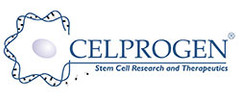AACR meeting April 2015
Feb 15th 2014
Celprogen will be presenting posters at the annual AACR meeting, in PA.
A Novel Pharmacological Inhibitor CEP1430 for Human Pancreatic Cancer Stem Cells
Pancreatic cancer is one of the most devastating human malignancies with an estimate yearly death of 280,000 and an overall median 5-year survival rate of less than 5%.
The development of relevant preclinical models of the disease to evaluate novel therapeutic strategies can accelerate basic research findings into the much needed clinical application.
We used our recently established three-dimensional (3D) in vitro culture assay system that resembles in-vivo tumor growth to screen small molecule libraries. We identified CEP1430, a sonic hedgehog (hh) pathway inhibitor as a potential drug lead molecule. We selected this molecule for further evaluation because the hh pathway is important for the maintenance of cancer stem cells. The CEP1430 treatment markedly inhibited in-vitro growth of human pancreatic CSC (IC50 value of ~10 nM).
In-vitro, CEP1430 induced apoptotic cell death of CSC and reduced pro-angiogenic but increased anti-angiogenic marker expression at the doses tested. In-vivo efficacy of CEP 1430 was evaluated in female SCID mice bearing human pancreatic CSC.
The once daily administration (ip) of CEP1430 (doses:10, 15, and 20 mg/kg) for 30 days resulted in 80%, 89% and 90% tumor growth inhibition. The tumor growth inhibitory effect of CEP1430 in all treatment groups was statistically significant in comparison to vehicle treated control (P<0.001).
The administration of CEP1430 for a period of 30 days was well tolerated without significant changes in body weight or toxicity by histological examination of tissues and organs.
We are using proteomic and miRNA platforms to monitor biomarkers of response, mode of action and selectivity of CEP1430. Further pre-clinical in-vivo studies are ongoing to project human dose and schedule as monotherapy and in combination with therapeutic vaccination to advance CEP1430 for clinical investigation.

